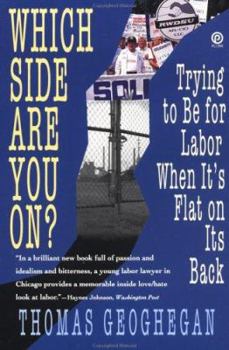Which Side Are You On?: Trying to Be for Labor When It's Flat on Its Back
Select Format
Select Condition 
Book Overview
The comic, poignant, one-of-a-kind book that reads like an enthralling novel (Studs Terkel). When it first appeared in hardcover, Which Side Are You On? received widespread critical accolades, and was... This description may be from another edition of this product.
Format:Paperback
Language:English
ISBN:0452268915
ISBN13:9780452268913
Release Date:August 1992
Publisher:Plume Books
Length:48 Pages
Weight:0.62 lbs.
Dimensions:0.7" x 5.3" x 8.0"
Customer Reviews
5 ratings
The decline of unions was not inevitable, and it can be reversed
Published by Thriftbooks.com User , 15 years ago
You know how some people say, "I don't believe in religion, but I believe in God"? Thomas Geoghegan doesn't necessarily believe in labor unions, but he believes in labor. Or maybe: he doesn't believe ultimate salvation is to be found in unions, but that there's no alternative to them for now, and that without them we're ... well, we're in the state we're in today, where workers are powerless and can be left unemployed and uninsured at any moment. A world without unions is a world where we're scared. This is just not the world we ought to be living in. There is a better way and a better world, of course. We know that we can't get to this world on our own. On our own, we are isolated from the rest of those who are suffering. We are powerless so long as we are isolated. It's virtually an axiom, then, that some form of collective resistance to limitlessly powerful corporations is necessary. We simply cannot do it on our own. It does not follow, however, that labor unions are the ideal form of that resistance. It also doesn't follow that government is the ideal form. But in their highly imperfect way, says Thomas Geoghegan, labor unions are far better than a world without them. He backs this up with story upon story about corporations absolutely crushing workers in the absence of any labor-union resistance. Geoghegan himself is a labor lawyer who's been fighting the fight alongside labor unions for a quarter century or more. He's also often worked against them: he's sued the Teamsters repeatedly, in essence fighting for more union democracy. He's trying to get the unions that the employees deserve. He's not had much luck fighting against them. For a short time, Geoghegan's heart leapt for joy when Ron Carey was at the Teamsters' helm, but the Carey era ended quickly enough and James P. Hoffa (son of Jimmy Hoffa) took over. As for fighting alongside them, that hasn't worked very well either. Unions are down to 10% or so of the working population. Not coincidentally (as any reader of Paul Krugman knows well), the Democratic party is in a shambles and has been for at least thirty years. The Democrats need the unions. What makes this book so agonizing is Geoghegan's insistence that a few little changes would bring democracy to the unions, unions to the workers, and the Democratic party to power. One such change is a card-check system like the one Canada uses. Consequently, Canadian union membership has been consistently in the 30% range for at least a decade. When we dream of the better world that Canadians seem to inhabit, it's well to consider how they got there. The fact that just over the border is a country not much different than ours, but whose policies could hardly be more different, gives the lie to the notion that unions have disappeared in the U.S. because of changing workplaces. Yes, we're now a service economy rather than an industrial economy. But so is Canada. Geoghegan dispenses with any number of commonplaces like this one. In gen
Recommended
Published by Thriftbooks.com User , 19 years ago
This is an outstanding book, full of heart and voice. I've begun using it in my Business Reporting class at Boston University.
Which Side Are You On?
Published by Thriftbooks.com User , 22 years ago
This is an excellent book about labor unions which sides with labor from a fresh perspective. Pro free trade, the author is not just peddling the same old protectionist line. From the first line of the book, you realize this author knows what he's talking about and speaks for no one but himself. Also a good book for anyone interested in the fortunes of the Democratic party.
Dynamite book
Published by Thriftbooks.com User , 23 years ago
I recently picked this up again. Both a great sketch of labor history and especially labor in the 80's, and also a kind of coming of age story of a man struggling with his idealism. For all that, it's absolutely fun to read - the tone is sharp and fast, and the author never takes himself too seriously. Reminds me of another favorite on a different topic, Cadillac Desert by Marc Reisner.
both devastating and inspiring
Published by Thriftbooks.com User , 24 years ago
I first read this book about 10 years ago, and I was struck by both the author's despair, and the amount of work that needs to be done. He does a great job of convincing the reader that unions are relevant. He also made me see that they should be saved, from themselves, and from the incredibly restrictive U.S. labour laws.





